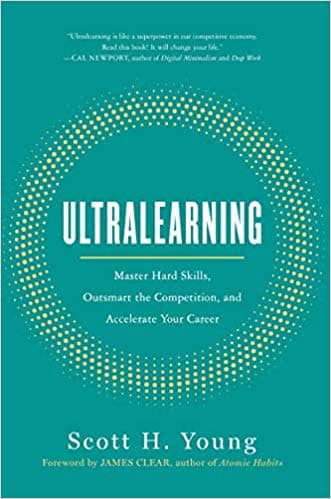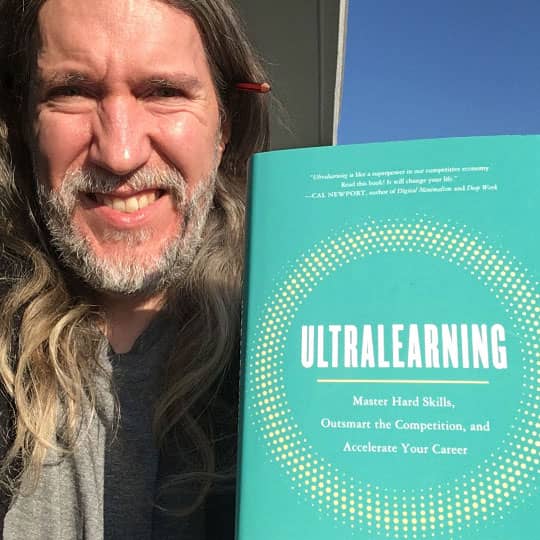Podcast: Download
Subscribe: Apple Podcasts | RSS

You know the routine:
It’s the night before a test, and instead of resting…
You’re “cramming” to try to remember the things that didn’t quite stick during a lecture.
Here’s the thing.
It’s not your fault.
And there truly is a better way to learn.
No, it’s not sitting and listening to a professor, reading or copying from a textbook, conversing with a language learning partner, or mindlessly practicing yet another skill suggested by a learning “guru”.
To help explain what really works, my guest today on the Magnetic Memory Method Podcast is Scott Young, author of the new book, Ultralearning.
In this book, Scott shares the stories of people like language learner Benny Lewis, Eric Barone, World Championships of Public Speaking finalist Tristan De Montebello, and the French Scrabble world champion Nigel Richards.
These are people just like you. The only difference is they’ve discovered a better way to learn, through “aggressive,” self-directed learning.
Today’s conversation with Scott not only explores the concept of “ultralearning,” but Scott shares his own efforts to learn more, better, and faster.
To be frank, a lot of involves simply directing your energy towards what works. Isn’t that better than spending years trying to fit into a traditional learning model that may not work for you?
So, if you’ve ever struggled to learn a new language through books alone…
If you’ve sat in a classroom only watching a professor demonstrate a chemistry experiment and not been able to “get it” because you lacked hands on experience…
If you’ve used trial and error to make the perfect recipe and still ended up with a soupy mess for pancakes or an overly salty roasted chicken…
Ultralearning can be the breakthrough you’re looking for to finally discover what really works for you to achieve you learning goals.
Press play now and learn all about:
- The definition of ultralearning and the origin of the term
- The difference between autodidacticism and ultralearning
- Why self-education is not always the best choice for effective and efficient learning
- The importance of being a skeptic while being a reader
- Why we really don’t know what we’re truly capable of…we’re actually shortchanging ourselves
- How ultralearning can be masochistic, yet beneficial
- Why you should actually care about the act of learning
- Why self-testing and feedback are necessary, even with self-directed learning
- The role of free will in education
- What meaningful progress looks like in achieving your learning goals
- The difference between procedural and declarative memory
- How and when mnemonics are useful
- Overcoming challenges with consistency in a learning practice
- Contrasting the traditional work model and entrepreneurship (pros and cons of each)
When it comes to consistency in scheduling, Scott is also tremendously generous in sharing how he schedules his time. Check this out:
So you see?
It’s really not so hard.
Does Ultralearning Get My Thumbs Up?
You bet!
I’ve actually been reading Scott’s emails for a long time and even sought out his okay to hold this live stream walkthrough of a piece on his blog about critical thinking:
I hope he and I will have a chat to discuss the role of critical thinking in learning more in the future. But for now…
Don’t miss this book and make sure you follow Scott Young!
Further Resources on the Web, this podcast, and the MMM Blog:
Scott’s interview with The Leefkoe Institute
Scott’s follow-up book, Get Better At Anything
21 Study Tips on MagneticMemoryMethod.com
Related Posts
- 7 Active Reading Strategies That Help You Remember More
Active reading strategies are often poorly misunderstood or lacking. Get these 7 active reading activities…
- 11 Benefits of Critical Thinking That Rapidly Improve Your Life
Critical thinking provides so many benefits. But did you know there's more than one kind…
- What Is Microlearning? The Truth You Need to Know
Microlearning confuses a lot of people because they think it's new. Learn old and new…






4 Responses
Hi Anthony, I listen to podcasts from about thirty podcasters and the ones I enjoy the most are from Joe Rogan, Sam Harris, Jocko Willink, Tim Ferris and you. I enjoy all your episodes and the only one I’ve ever felt was an infomercial was the one about Olly Richards’ books. Thank you for what you do. I hope it’s really profitable for you.
Regarding free will, the Bhagavad Gita has a lot to say about the enlightened view of action like, “Having cast off attachment to the fruit of action, ever contented, depending on nothing, even though fully engaged in action he does not act at all.” (4.20) It’s a hard topic but ultimately I’ve come to the conclusion that it’s yin and yang – ie both points of view are valid even though they’re irreconcilable. But ultimately I think it’s like Nisargadatta says, opposites without opposition.
Just some thoughts….
Regards,
Andrew.
Thanks so much for taking a moment to share your thoughts, Andrew. That is much appreciated.
Great reference to Bhagavad Gita, and these are some of my favorite lines in the Upadesa Saram that I’ve memorized.
Three says:
“If you surrender your attachments to the results of your actions, that will purify your mind and provide a path to liberation.”
Five says:
“Rituals should be done with the attitude you are serving the world, which is made of the laws that govern the universe.”
I do indeed put out these podcasts as a kind of ritual and am getting better at the practice of releasing the outcome.
It’s a funny thing that memory turns out to be so closely related to these matters. I look forward to more of the ritual and appreciate you joining the dance very much!
Hi Anthony,
I’ve listened to most of your podcasts and have interacted with you via email and the Master class. Somehow, you always keep the material interesting and fresh. It is much appreciated!
You asked for feedback on some of the discussion on free will and whether it resonated in an appropriate way, as I understood the question.
I found the back and forth between you and Scott to be not only appropriate, but made the material more engaging. While you may at first have felt that it bogged things down, I found that part of the discussion to sort of pull me in, wondering how this would turn out… Just a tiny bit of drama doesn’t hurt to make things more, well, magnetic… 🙂
Thanks very much for your feedback on this one, Mike. Apparently my concern was a bit unwarranted as many people have said this is their favorite episode so far.
Drama is indeed the most important agreement it seems – likewise with our Magnetic Imagery. When created correctly, it will draw us through the process and to the target imagery.
Thanks again for listening and providing your feedback. Much appreciated! 🙂